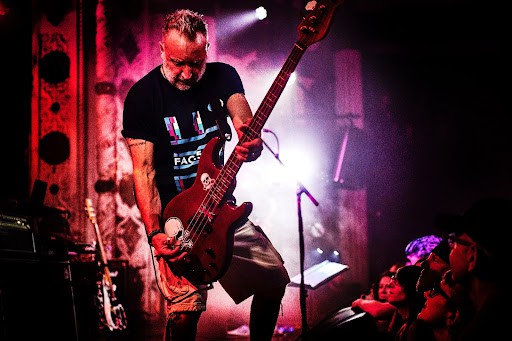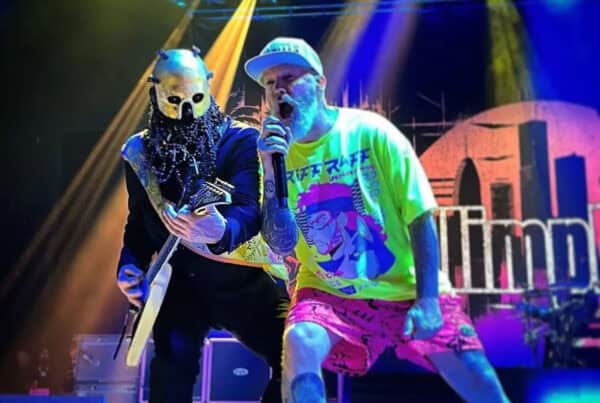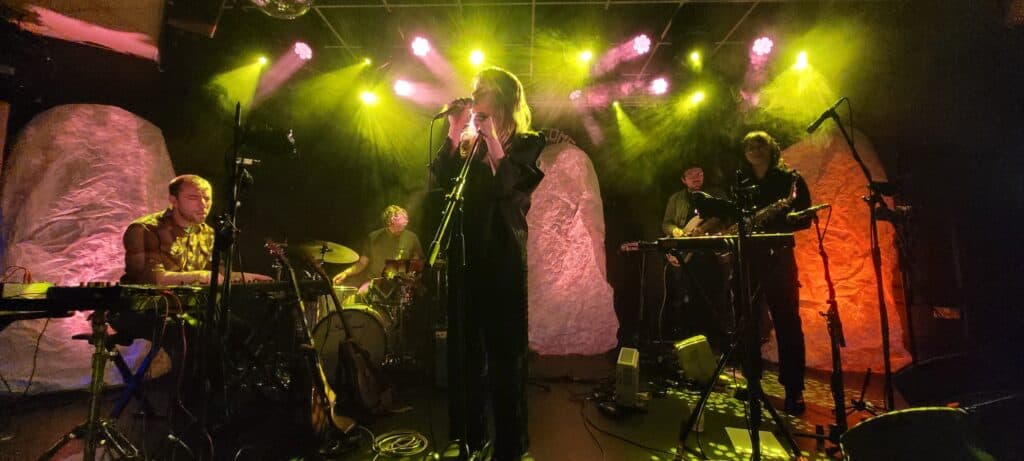Since 2010, Peter Hook has passionately toured the works of Joy Division & New Order. His current band, The Light, possess a divine grip over the material; for three hours and two sets, audiences are immersed within the histories of Factory Records and Ian Curtis through a genre-defining catalogue like no other.

After recent performances in Mexico City, São Paulo, and Toronto, York Barbican offers the perfect homecoming venue for The Light. In our August interview (found here), Hook explained what the Substance tour entails. New Order’s Substance (1987) is, above all, a collection of hits already cemented within the pop subconscious. In contrast, Joy Division’s Substance (1988) compiles a mishmash of semi-hits and throwaway singles, typically reserved for the adoration of stalwart fans. The consequent show is therefore an unusual combination of musical touchstones and landmarks from a career that spans five decades.
One such landmark is the set opener, ‘Your Silent Face’. Its pastoral, Kraftwerkian ambience prepares us for the synth-oriented soundscapes to follow. Hook, front and centre, performs the brief harmonica passage at the melodic core, while allowing the York crowd to fill in the infamous final line: “why don’t you… piss off!”
Soon, the hearts of each and every fan is struck by ‘Ceremony’. Within a rich history of recordings – from Ian Curtis’ original, to New Order’s revised take, alongside covers from Galaxie 500, Radiohead, and even Xiu Xiu – The Light’s interpretation is the most complete. It’s a tune that continues to defy the passing of time, an elegiac guitar-pop coda that has shaped the sound and temperament of modern indie rock.
Upon reaching the concluding line – “Where did he go?” – we’re fully absorbed within the dynamic at hand; a rekindling of Curtis’ magic, rather than mere replication. Hook is an impressive performer, soldiering through an extensive tracklist spanning ‘Mesh’ to ‘Shellshock’. In our discussion, Hook was forthright about the difficulties of translating the original recordings into live material. New Order’s sound is layered, intricate, and steeped in technology of the time. It’s far more manufactured than Joy Division’s minimalist interplay of angular guitars and the occasional, moody synthesiser pattern. Regardless, we soon find ourselves entering a topsy-turvy world of heightened stimuli, navigating events from the mad night before, and the humdrum consequences of the morning after.
This dynamic is the heart of New Order. Warbled synthesiser patches merge with a metronomic fusion of man and machine, before finally giving way to a poisonous cloud of smoke: ‘Everything’s Gone Green’. Despite preceding acid-house by half-a-decade, this prescient tune immerses us within the unbridled euphoria of past transgressions. Similarly, ‘Blue Monday’ ushers the crowd into a techno-futurist simulation, in which one’s body moves automatically, if not from choice. When that infamous vocal sample comes in – mined from Kraftwerk’s ‘Uranium’ – one becomes immersed within the fluorescent history of electronic music, as well as the sweaty confines of FAC51.
Hiding somewhere within the York crowd, Hook makes sure to shout out recording engineer Mike Johnson, who played a vital role in some of the band’s most iconic tracks. His name recalls a special time and place: Britannia Row, 4AM.
“Mike, this one’s for you, mate.”
And so ‘The Perfect Kiss’ commences, Hook and his bandmates powering through all ten minutes of the synth-pop odyssey. David Potts takes the lead throughout, effortlessly mirroring Bernard Sumner’s boyish vocals, while Hook joins for the anthemic chorus. Psychedelic frog croaks and epic bass solos abound, there’s no doubt, in my mind at least, that it’s not only the greatest song of its decade, but this, right here, is the best rendition of it.
Set finales follow this euphoria to its natural conclusion. While ‘Bizarre Love Triangle’ entrances the crowd with its disco-inspired power pop, ‘True Faith’ is an anthemic love-letter to New Order’s golden age. At the corner of my eye, fittingly enough, is a white-shirted man highlighted among the mass of bodies; sweaty, wild-eyed, somewhat maniacal. Hook raises his eyebrow a little, as if to say: “I want whatever you’re having, mate.” The man forms a veritable snapshot of a particular movement in history; a ghost, almost, of the Hacienda haze.
Following this high, then, is a well-deserved break, scored by Kraftwerk’s ‘Trans Europa Express’. For the final set, I lend my left earplug to my partner, whose eardrums are already giving way. Opener ‘No Love Lost’ brings with it an additional edge; a sonic crunch that replaces synthesiser overloads with something earther, heavier, and somewhat motorik.
Whereas New Order demands [true] faith, Joy Division is ripe for revision. As Hook noted in our interview, “forty-four years on, you correct little errors.” The Substance compilation is, as expected from a set of young punks finding their feet, full of errors. Emerging from the slumbers of post-punk obscurity, then, are the likes of ‘Glass’ and ‘From Safety To Where’, developed into arena-sized, industrial-textured beasts. There’s hints of Ian in the vocals, with Hook’s voice settling into a comfortable groove, capturing Curtis’ baritone magic in a way that Sumner can’t.
‘Disorder’ makes a well-received appearance thereafter, but ‘Warsaw’ is what gets my heart pumping. From the opening serial number to the wild interplay of bass, drums and guitar, this proto-punk relic re-emerges within an alien world built upon its buried carcass. In fleshing out the original composition, Hook adds a whispered bridge to the final section, giving way to the iconic epilogue: ‘3 5 0 1 2 5 !’
‘Autosuggestion’ and ‘Digital’ follow with ambient backdrops that compliment the raw interlocking of guitars. Both songs build to a chaotic climax, invoked through Hook’s impassioned vocals. Meanwhile, The Light’s rendition of ‘She’s Lost Control’ chooses the metallic clangs of the original single over the skeletal, almost alien beat of the Unknown Pleasures (1979) LP recording. The final result combines both versions to form something heavier and grander, with the gorgeous synth outro seeing it to a dystopian conclusion.
‘Shadowplay’ is similarly refined; The Light’s interpretation is sweaty, brutalist, and unmistakably monochrome, reminding us of Joy Division’s understudied influence from hard rock and heavy metal. It demands movement, rendering a tectonic shift that prompts the listener to lock into its carnal energy. Naturally, a palette cleanser follows: ‘Incubation’, which extends into ‘Dead Souls’. Hook’s bass takes centre stage throughout, summoning a guitar-strung wasteland in which words are traded for rhythms.
The set concludes with two classics: ‘Atmosphere’ and ‘Love Will Tear Us Apart’. Both tunes remind us of what was, and what might have come, with Ian Curtis’ memory inextricably attached to the moving lyrics. Hook, clearly, has come to understand these songs differently over the years, having seen their profound impact upon crowds.
With the triumphant ‘Love Will Tear Us Apart’ seeing York into the night, I’m reminded of Hook’s painstaking dedication to his craft, as articulated in our previous conversation.
“These are long gigs. It’s hard for the audience, you need to stay concentrated, get through it, but it makes me very happy. And it also means all those gigs I missed out on during New Order, I’m now catching up on.”
“One day, I wanna play a gig when everyone goes home. Just carry on playing, song after song, until the audience starts to dwindle, like ‘Come on! We can do it, just one more!’.. I might actually do it.”
Indeed, from a note-to-note resurrection of ‘The Perfect Kiss’, to modern reworkings of An Ideal for Living (1978), the legendary bassist remains unrelenting. For lovers of Manchester’s rich musical heritage, the Substance tour brings a kaleidoscopic, career-encompassing catalogue back into the light it deserves.






